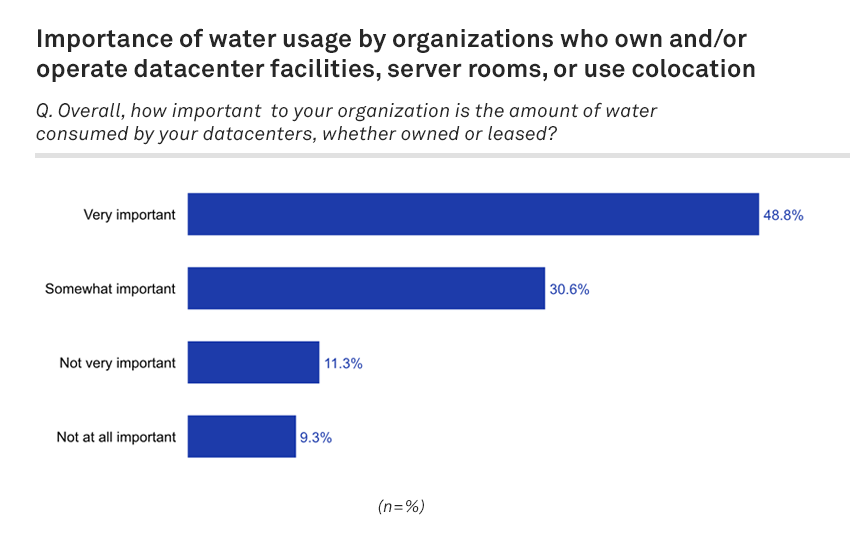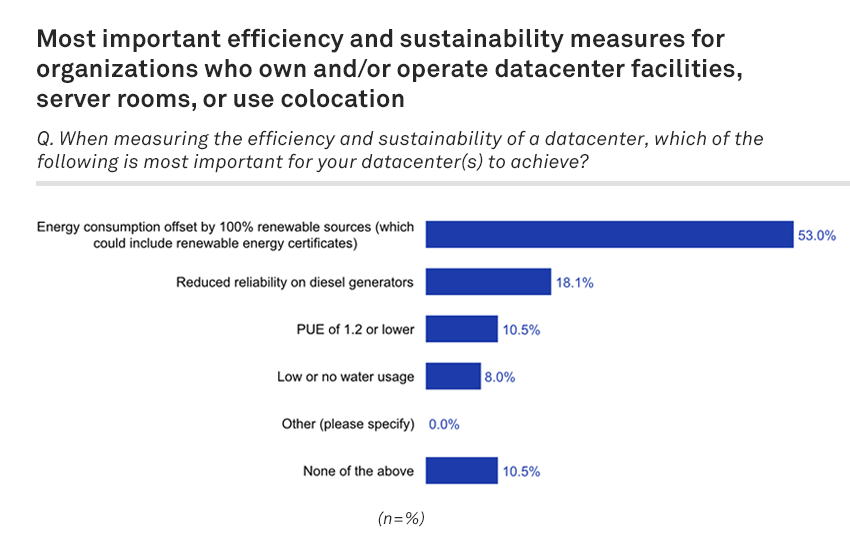
Sustainability has become a priority for datacenter providers and customers alike. With an increasing number of organizations setting sustainability goals, issues like pursuing carbon neutrality, reducing water usage and finding alternatives for diesel generators have become common talking points for datacenter industry players.
As organizations look to incorporate sustainable solutions in their datacenter operations, renewable energy sources have seen higher rates of adoption. Simultaneously, efficiency gains remain crucial, as they often bear a financial weight on the organization’s bottom line: the more efficient a datacenter’s operations, the lower the cost of its power bill. In a recent 451 Research study, over 1,000 IT decision-makers were surveyed to better understand how topics of renewable energy, sustainability and efficiency are currently impacting the datacenter industry.
Decarbonization as the top priority
Efficiency and sustainability are increasingly important topics for organizations that leverage datacenters, owned or leased. The survey results saw most IT leaders (63%) consider these factors as “very important”, up from 54% in 2022. Another 26% said those factors were “somewhat important”.
Furthermore, when asked to select the most import sustainability and efficiency measure in their facilities, survey respondents indicated that decarbonization is currently their top priority – 53% of survey respondents selected offsetting energy consumption with 100% renewable energy as their most important measure.
Aspects like a lower power usage effectiveness (PUE) and reducing reliability on diesel generators were further down the list, selected by 11% and 18% of survey respondents, respectively.

Emphasis on lowering water consumption
Results from the survey also indicated that IT leaders are increasingly aware of their datacenter’s water consumption. Almost half of survey respondents (49%) stated that the amount of water consumed by their organizations’ (leased or owned) datacenters as “very important”, with another 31% saying it is “somewhat important”. This concern is seemingly shared by both datacenter providers and customers alike, as we see more organizations monitoring and reducing their water consumption, with some, for example, moving away from adiabatic cooling.

Sustainability as a factor in datacenter decision-making
Sustainability has become part of the decision-making process for organizations looking to open or close datacenters. Most survey respondents had either recently opened a new datacenter (25%) or had plans to open a new one soon (38%), while a smaller percentage had either recently closed a datacenter (19%) or had plans to close one in the near-term (16%).
For the survey respondents closing a facility, 36% mentioned improving their organization’s carbon footprint as the primary driver behind the move. For those opening one, improving their organization’s carbon footprint was a primary driver for a smaller percentage, 16%. In either case, a firm’s carbon footprint was one of the top factors behind the decision, as organizations become more concerned about the efficiency of their facilities and the carbon intensity of their datacenter’s power supply.
Industry optimism
IT leaders seem generally optimistic about their ability to hit sustainability goals. Almost half (45%) of survey respondents indicated that they have set formal sustainability goals, while 31% state that they have informal or tentative goals in place. Another 10% indicated that they are working on goals that should be set in place in the next two years.
Out of the organizations with sustainability goals in place, formal or informal, 57% stated it is “very likely” that they will hit these goals, and another 40% stated it is “somewhat likely”. Yet, some still face barriers. The remaining 3% of survey respondents indicated that external factors as the “most likely” obstacles faced in the process, such as a technical barrier (22%) or an existing long-term contract causing delays (20%). Other barriers include uncertainty as to how to measure success (17%), lack of prioritizing by the company (13%) and a lack of plans or standards being put in place to meet sustainability goals (12%).
Want insights on datacenter trends delivered to your inbox? Join the 451 Alliance.

